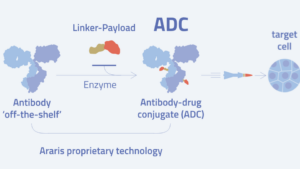
Reproducible nanopore sequencing to be commercialised from 2026
For nearly two decades, Roche AG has been searching for a next-generation sequencing method in personalised medicine to overcome the limitations of short read lengths in existing sequencing technologies. Following beta testing, the company plans to launch its new Sequencing by Expansion (SBX) technology commercially next year.
With the Broad Institute serving as a beta tester, Roche aims to first explore the potential applications of Sequencing by-Expansion (SBX)-Technology , which was introduced in February. The nanopore-based sequencing method will initially enter the global market in 2026 for Research Use Only (ROU). In the medium term, however, Roche intends to establish SBX as the gold standard for diagnostics and stratification in personalised medicine.
Broad Clinical Labs, a subsidiary of the MIT and Harvard-affiliated Broad Institute, will assess SBX’s potential in theranostics. Although financial details of the agreement remain undisclosed, Roche appears to be primarily interested in leveraging the Broad Institute’s extensive network of leading genomics researchers. An initial pilot project will focus on diagnosing rare genetic diseases through whole genome analysis.
Beyond diagnostics, SBX will also be used to select patients for clinical trials and to support research applications such as target screening via single-cell RNA sequencing. Current collaborations include projects with Edwin Cuppen from the Hartwig Medical Foundation to sequence cancer genomes, and with Aziz Al’Khafaji from Broad Clinical Labs to determine cancer therapy responses using multi-omics analyses.
Unlike methods used by U.S. market leader Illumina, SBX enables the reading of entire genes—rather than just short fragments—with high speed, accuracy, and error-free performance. Its ability to generate read lengths exceeding 100 kilobase pairs offers new insights into disease mechanisms and therapeutic targets, driving forward the field of personalised medicine.
The scalability of SBX, developed by Stratos Genomics co-founders Mark Kokoris and Robert McRuer, is made possible by a high-throughput complementary metal-oxide-semiconductor (CMOS) sensor module. This enables fast, real-time base calling and supports parallel processing of multiple samples, making the technology suitable for both small-scale research and high-throughput clinical diagnostics.
The collaboration with Broad Clinical Labs is intended to integrate SBX into clinical and translational workflows, ultimately leading to its adoption in routine diagnostics. A joint feasibility study will demonstrate the viability of family-wide whole genome sequencing in neonatal intensive care settings and as a standard diagnostic tool for diseases such as cystic fibrosis and sickle cell anaemia.


 Araris Biotech AG
Araris Biotech AG Roche
Roche BioNTech SE
BioNTech SE